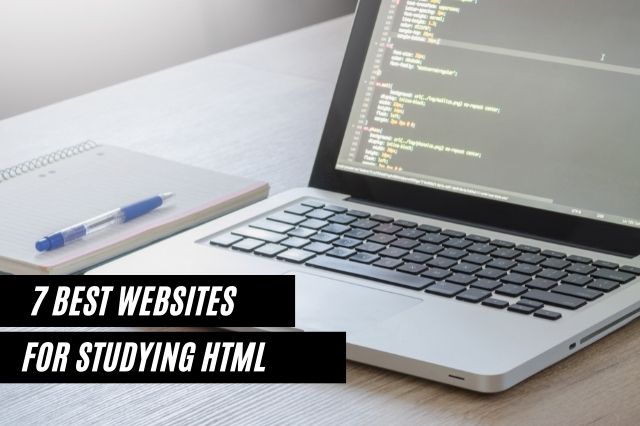7 Best Websites For Studying HTML In an Easy and Effective Way

If you are interested in learning HTML, Here is a list of 7 Best Websites For Studying HTML in an easy way.
Learning to build websites with HTML is not that hard given that out of all elements, in the end, you’ll need 30 at most. Yet, if you are completely new to the world of web development, you may not understand a thing about it like a freshman looking at a dissertation.
When you need help with dissertation writing, you google for more information and, just like with anything on the internet, find an endless list of options. Which one is credible? Which one won’t waste your time and give valuable information? Where are the easy explanations and what resources will blow your mind?
Read on to find the list of the best resources that will simplify your educational process.

Theory-Based Websites For Studying HTML:
1. HTML Living Standard
The website, as you open it, looks like heavy reading, and it is indeed. Unless you have time to go through the whole table of contents, it’s recommendable to start with sections 3 and 4 to get to know about the elements.
As you become able to build a simple webpage, you might wanna add features, improve your code. That will be the time to go through the whole manual. Also, while creating a page using HTML, you will be definitely facing some additional issues, so this highly structured guide will be of great help.
Its advantages include but are not limited to:
- regular updates;
- ability to contribute to the development;
- option to report a new bug.
The website is also stored in the PDF, developer, one-page, and multipage versions. The developer’s edition is refined from extra information that may be of no use for you, at least at the beginning.
2. HTML Reference
The website is pretty easy to use and has a user-friendly interface. It’s rather minimalistic – in comparison to the previous point on the list.
The home page offers a helpful table with filters for the beginners to check instantly what elements they’re dealing with:
- block;
- inline;
- meta;
- experimental;
- self-closing.
As you move further, the guide splits the content into several groups of elements. Each of them presents concise explanations, simple examples, and accurately structured tips on the tags’ attributes.
3. DevDocs
In many aspects, this website combines several features existing separately on other guides. There you can find:
- examples in an editor window and what they look like in a browser;
- a short summary table;
- info about attributes;
- tips on how to use the tag properly;
- details on the compatibility of the elements with different browsers.
The section about obsolete tags is even more useful. Beginner developers always look for some tips on forums when searching for an answer. Quite often, the latter is not that fresh. So, the outdated methods are applied as a result. This section is like an HTML history book that will explain why you should never ever use that tag mentioned on a forum in 2012.
4. MDN Web Docs
MDN Web Docs contain guides on various technologies, and HTML is among them. The guide is much more detailed and may look messy at the beginning. Yet, the navigation is quite intuitive. There are numerous hyperlinks in the articles, just like in Wikipedia.
You can also see the table of contents, the way back to the initial page hosting the subtopic as well as related topics on the left side of the page. Just like DevDocs, the website contains information on the compatibility of the elements in browsers and those that are obsolete. In addition, the experimental and non-standard ones are marked with self-explanatory icons.

Practise Based Websites For Studying HTML:
Theoretical materials are always a good basis, but you won’t make use of them without practice. So, ensure that you take turns reading and coding using at least one of the platforms listed below.
1. FreeCodeCamp
This gem offers a window where you can code with the subsequent output in the same tab. It’s a much easier way to get used to the syntax of HTML and not get distracted by switching between the editor and the browser. As you progress, you can choose numerous other exercises.
The platform provides tips, structured instructions, and a simple interface. It contains 7,000+ tutorials, and, as you can guess from the name, all of them can be accessed for free.
2. CodePen
In contrast to the resource above, CodePen allows for a combination of technologies in one tab. As you choose ‘Try Editor’, three windows will appear:
- HTML
- CSS
- JavaScript
You don’t need to use them all, only the ones you need. You can start with HTML and, in case you’re curious enough to try some simple features, add design or scripts.
The editor is also very useful for open-source code that can be tested here before you upload and apply it to your own website. CodePen is often in-built into other resources where examples are presented. One of them is Free Frontend where you can search HTML code examples if you need any.
3. Nu HTML Checker
Finally, the code validator will teach you not to mess with HTML5 and its standards. Even if you don’t practice in a basic code editor at the beginning, sooner or later, you’ll have to work with it. Despite the number of available extensions, like on VS Code, code editors still may lag behind in tracking whether the code is written in line with HTML5. So, you’ll need this website.
As you insert the code, the validator starts checking it line by line. When it sees the mistake, it reports on it but doesn’t go deeper into the code tree. So, unless you fix that mistake in the tag where the rest of the code is stored, the validator won’t let you see the report on other mistakes. This can save you a lot of time and effort.
Why So Many?
The number of internet resources is endless, so this list can go on and on. The websites for studying HTML presented above are not must-reads for HTML learners, but each of them is definitely a must-try.
Each resource offers a unique structuring and presentation of information. If a website is not for you, you can try another one to find the best approach.

